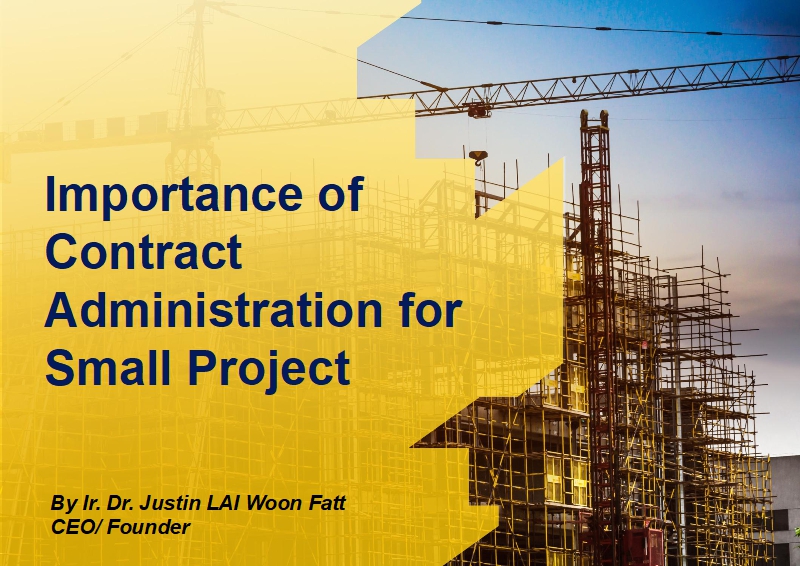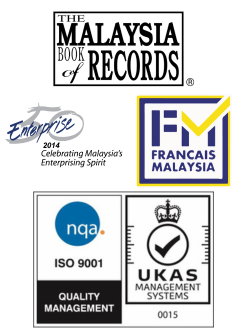Author: Ir. Dr. Justin LAI Woon Fatt | 28 October, 2020
What is contract administration?
Contract administration is the management of contract between the client and the contractor in which the contract administrator is usually appointed by the client to manage, communicate, negotiate, and execute the whole contract process. It involves making decisions and timely information flow to ensure the completion of project work in accordance with the contractual documents.
What are the purposes of contract administration?
Contract administration helps to determine that the project is progressing in compliance with the contracts related to procurements, supervision and site record, valuation and payments assessments, submission of claims for additional payment, the extension of time, rectification, and so on. Furthermore, it allows final chance to detect any inaccuracies, inconsistencies, and uncertainties in the design. A proper contract administration monitors and controls project risk that ensures the project to be completed with quality control within a stipulated budget and timeframe. Moreover, it is essential in shaping a good business relationship since poor contract administration could result in construction disagreements. Late compliance with contractual requirements might take a longer time for the contract to be completed, hence incurring additional cost, which further leads to disputes and claims between dissatisfied parties.
When does contract administration begins and ends?
The contract administration process involves all activities from the initial stage to the final stage. It begins with the project planning (design) stage, followed by the tendering stage, construction stage, and finally completion and final account stage. It usually ends up with project acceptance either after project completion with due performance or termination of contract due to poor performance of any parties engaged in the contract.
Process for contract administration
WHAT ARE INVOLVED IN CONTRACT ADMINISTRATION?
During the design stage, the contract administrator plays a major role in controlling cost and schedule under pre-determined terms with the client. The design brief is presented including relevant information such as land use, compliance required by local authorities, proposed budget, and development period. Not only prepare the contract documents after final drawings available, but risk allocation is also focused to identify what are the risks pass to the contractor and undertaken by the client respectively. In this phase, the important factors related to construction risk that need to be highlighted are the construction period, liquidated ascertain damages, defect liability, retention sum, and payment. The contract administrator has to communicate the responsibilities with all parties involved.
During the construction stage, the contract administrator not only monitors and controls cost and time, but also has to ensure the compliance of work with paperwork requirements, specifications as well as the statement of work for quality assurance and control. There are two types of monitoring methods, namely direct and indirect observations.
- Direct observation: The contract administrator has to be physically present at the site during work performance to see how the work proceeding and compare the actual observations to the construction specifications or drawings to the schedule.
- Indirect observation: Extensive reports from many observers, regular process meetings, formal testing, technical reviews, performance indicators, and audits should be applied whenever the direct observation provides insufficient information for the progress measure.
Change management is generally involved in this phase. Essential factors to be considered are progress claims, delays, variations, EOT (extension of time), and other legal matters. Typical delays can be categorized into excusable delay and non- excusable delay in which excusable delays are delays beyond the control of the contractor and without any default parts on the contractor. Hence, in this case, the contract administrator shall estimate the length of delay beyond the date of the project’s completion to grant a reasonable extension of time. Following are the circumstances where EOT can be granted:
- Force majeure/ act of God
- Exceptional inclement weather
- Natural calamities such as fire, lightning, explosion, storm, and flood
- Contractor does not receive in due time from the engineer any necessary instructions and drawings
- Delay in awarding site possession
- Shortage of construction materials from suppliers
If there is a work delay and the contract is not performed well, EOT will not be granted. Late process delivery might impose fine on the contractor. It is possible that the situation may require charges on liquidated and ascertain damages (LAD) upon late completion, dispute resolutions, or the worst, contract termination. The client has the right to completely or partially discontinue the contract performance due to the contractor’s poor performance in construction works.
Dispute management and resolution are involved in contract administration planning too. It includes agreement on the procedure to follow to resolve conflicts arise between parties regarding responsibilities. It is common to have the request of changes during normal contract execution, hence the contract administrator should at first establish an agreed procedure to review and escalate the issues whenever necessary, trying to keep the disputes to minimum without leading to litigation that destroys the business relationship between parties.
The contract administrator has the responsibility to ensure the financial interest of clients is protected. The client is obliged to pay on a timely basis for the completed work in accordance with the terms and conditions in the contract. This usually covers the scope:
- Process payments due according to the contract
- Evaluate financial implications of contract alterations, in terms of original costs and allocated budget.
- Release of retention sum for bid bonds, performance bonds, advance payment bonds
In conclusion, it is advisable to engage professional consultant as contract administrator to protect your rights and interests, no matter how small or large the project. Hire contract administrator is definitely worth more than you spend.
Ir. Dr. Justin LAI Woon Fatt
CEO/ Founder
IPM Group
References:
[1] Amila Gamage (17th June 2018) Contract Administration Retrieved on 8th July from https://thecontractsengineer.com/construction-contract-administration-basics/
[2] UN Procurement Practitioner’s Handbook Retrieved on 8th July from https://www.ungm.org/Areas/Public/pph/ch03s10.html


